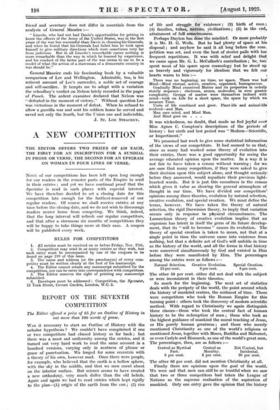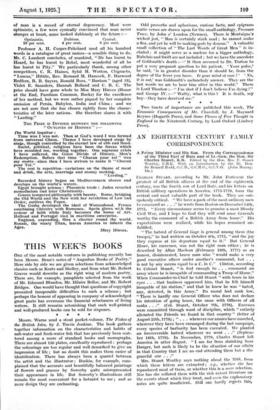REPORT ON THE SEVENTH COMPETITION
The Editor offered a prize of 15 for an Outline of History in not more than 100 words of prose.
WAS it necessary to start an Outline of History with the nebular hypothesis ? We couldn't have complained if one or two competitors had chased history so far back ; but there was a most sad uniformity among the entries, and it turned out very hard work to read the same account in a hundred versions, varying only in neatness of phrase or grace of punctuation. We longed for some eccentric with a theory of his own, however mad. Once there were people, for example, who believed that the earth is a hollow sphere, with the sky in the middle, and that we men crawl about on the interior surface. But science seems to have created a new orthodoxy, very much duller than the old beliefs. Again and again we had to read entries which kept rigidly to the plan—(1) origin of the earth from the sun; (2) rise
of life and struggle for existence ; (3) birth of man ; (4) families, tribes, nations, civilizations ; (5) in the end„, attainment of full consciousness.
Perhaps Dayton has done the mischief. Or more probably' it is Mr. H. G. Wells. But he had plenty of Space at his disposal ; and anyhow he said it all long before the com._ petition was set, and even the best of stories pails with too frequent repetitions. It was with relief and delight that we came upon Mr. G. L. McCulloch's contribution; he, too; spent most of his space upon cosmology but he stood up so bravely and vigorously for idealism that we felt our hearts warm to him There was no beginning, no time, no space. There was but Mind—Mind eternal, active, creative organized, homogeneous.
Gradually Mind conceived Matter Lid its properties in orderly stately sequence ; electrons, atoms, molecules, in ever greates complexity. Groups of matter were themselves imbued with mind—took on Life for a short space, the space by which we measure Time.
Units of life combined and grew. Plant-life and animal-life evolved—and Man.
Man uses mind, and Mind Man.
And Mind goes on . . .
It was wickedness, no doubt, that made us feel joyful over Miss Agnes C. Compton's descriptions of the periods of history : her sixth and last period was "Modern—Scientific, or Impertinent."
We promised last week to give some statistical information of the views of our competitors. It had seemed to us that,' since so many had worked some theory of evolution into their entries, there was a good opportunity for seeing the average educated opinion upon the matter. In a way it is not fair to have taken a census without warning ; for we are sure that many competitors, if they were asked to give their decision upon this subject alone, and thought seriously+ before they answered, would repudiate their previous light- hearted words. But it is just this casualness in the census which gives it value as showing the general atmosphere of thought in our time. We have divided our .competitors': opinions among three theories, evolution by natural selection,' creative evolution, and special creation. We must define the terms, however. We have taken the theory of natural selection, the rigid Darwinian theory, to imply that variation occurs only in response to physical circumstances. The Lamarckian theory of creative evolution implies. that an organism has latent, in itself the germ of its future develop- ment, that its "will to become" causes its evolution. The theory of special creation is taken to mean, not that at a single point in time the universe came into existence from nothing, but that a definite act of God's will unfolds in time as the history of the world, and all the forms in that history were conceived simultaneously by God and existed in Him before they were manifested by Him. The percentages among the entries were as follows :—
Natural Selection. Creative Evolution. Special Creation.
23 per cent. 9 per cent. 9 per cent.
The other 59 per cent. either did not deal with the subject or were inconsistent in their. theories.
So much for the beginning. The next set of statistics- deals with the peripety of the world, the point around which the history of mankind centres, the midmost of time. There were competitors who took the Roman Empire for this turning point : others took the discovery of modern scientific method. With regard to Christianity we again distinguish three classes—those who took the central fact of human history to be the redemption of man ; those who took as the highest guidance of mankind the moral teaching of Jesus, or His purely human greatness ; and those who merely mentioned Christianity as one of the world's religions or mentioned Jesus, together with Moses, Buddha and Mahomet, or even Carlyle and Bismarck, as one of the world's great men. The percentages, then, are as follows :— Central as Mystical Central as Not Cmtral, but
Fact. Morality. Incidental.
6 per cent. 8 per cent. 20 per cent.
The other 66 per cent, did not mention Christianity at all.
_ Finally there are opinions upon the goal of the world. We were sad that men can still be so trustful when we saw that two or three competitors had taken the League of Nations as the supreme realization of the aspiration of mankind. Only one entry gave the opinion that the history
of man is a record of eternal degeneracy. Most were Optimistic, a few were cynically convinced that man never changes at heart, some looked .dubiously at the future
Optimistic. Dubious. Cynical.
39 per cent. 4 per cent. 6 per cent.
Professor A. H. Cooper-Pritchard used all his hundred Words in a catalogue of great .names—a- sensible thing to do. - Mr. C. Lambert concludes, of .mankind, -"Ile' has learnt. to Hoard, he has learnt to Rebel, most wonderful of all he has learnt to Pity:" We particularly. thank, among other competitors, C. R. Haines, Sybil M. VVotton, Chignacto, " Luscus," Hittite, Rev. Bernard M. Hancock, F. Harwood Redfern, R. B. Sayers, Ronald Ross, ." Bantam " (aged 18), Violet E. Saunders, Hannah Bolland and C. R. C. The prize should have gone whole to Miss Mary Hinves (House at the End, Farnham Common, Bucks) for the excellence of her method, but we were rather piqued by her' complete omission of Persia, Babylon, India and China ; and we are not sure that she has chosen rightly from the charac- teristics of the later nations. She therefore shares it with "Larding."
THE PRIZE IS DIVIDED BETWEEN THE FOLLOWING "OUTLINES OF HISTORY" :- The World loquitur :
Time was I was not. Then at God's word I was formed from universal Chaos. Thence I have developed stage by stage, though controlled by the eternal law of ebb and flood.
Social, political, religious have been the forces which have moulded me, working together. One supreme crisis I have suffered, the Great Divide of History, Man's Redemption. Before that time " Chacun pour soi " was my motto—since then I have striven to make it " Chacun pour Toi."
The rest is repetition—variations on the theme of meat and drink, the arts, marriage and money making.
"Larding."
Recorded history began on Mediterranean shores and develops on the world's waters.
Egypt brought science : Phoenicia trade : Judea revealed monotheism and later Christianity.
Greece tempered philosophy with beauty. Rome, bridging the Old World and the New with her revelation of Law and Order, outlives the Popes.
The Goths developed the ideal of Womanhood. France combining Chivalry with Romance. Spain glows with the ardour of faith while Italy becomes the home of Art. Holland and Portugal vied in maritime enterprise.
England, expanding, flies a charter round the world. Russia, the weary Titan, leaves America to inherit the Ages. Mary Hinves.







































 Previous page
Previous page